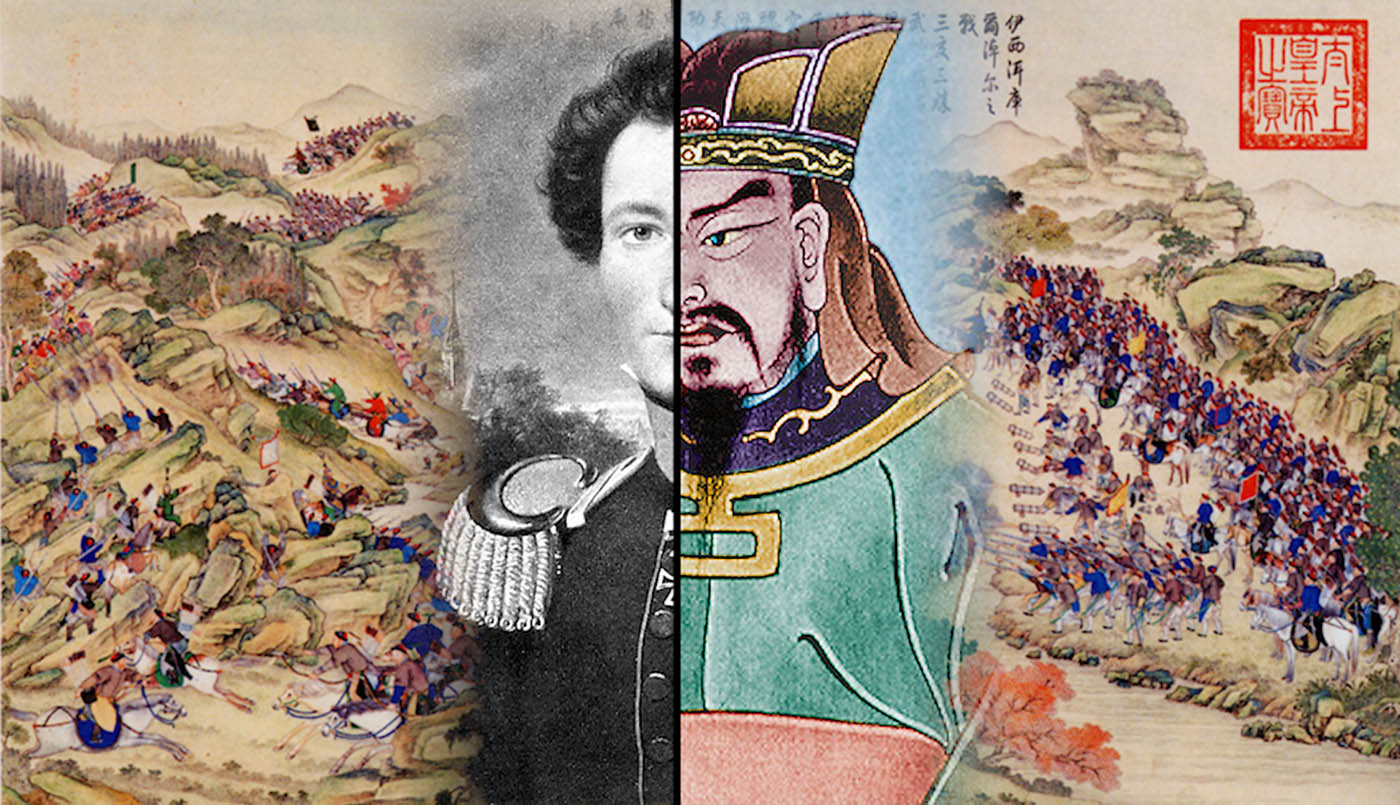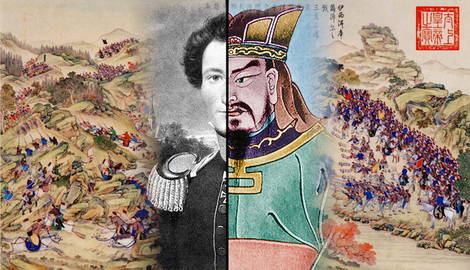
In the history of military strategy, no theorists garner the same respect or have had as much influence as Sun Tzu and Carl von Clausewitz within their respective traditions. Sun Tzu was a Chinese general and ancient military strategist from the 5th century BC and reputed author of Bingfa (The Art of War), the earliest known work on strategy. Carl von Clausewitz was a Prussian general and strategist from the late 18th and early 19th centuries who fought in the Napoleonic Wars. He is famous for his work Vom Kriege (On War) published in 1832.
The works of these renowned strategists comprise two of the most respected and well-known military classics ever produced, and they have generated a fascinating dialectic thanks to the remarkable differences in their respective theories. This article will compare and contrast some of the most poignant principles found in Sun Tzu’s Art of War and Clausewitz’s On War, and in doing so will pose the age-old question: who is the greatest military strategist of all time?
What Was Warfare For Sun Tzu And Clausewitz?

The first significant difference between Sun Tzu and Clausewitz is their framework. Their definitions of warfare have a very different scope and range of elements, which set the stage for the rest of their respective philosophies.
Sun Tzu’s framework consists of an expansive perspective on warfare which included not only military matters, but also a large variety of non-military factors that nevertheless influence the military realm, such as diplomacy, economics, and psychology. Perhaps due to this broader framework, Sun Tzu was very cognizant of the potential ramifications that waging unlimited warfare can have on non-military matters, and he highlights the importance of minimizing these costs as much as possible.
Because of this awareness, Sun Tzu urges generals to pursue a maximin strategy, in which he achieves the outcome that yields the smallest loss, rather than the greatest reward. A general must be calculating, rational, and unswayed by visions of personal heroism.

Clausewitz’s framework is much narrower and more strictly defined, consisting exclusively of military matters. He recognizes the importance of other arenas and that warfare is never an isolated act —indeed he is famous for his aphorism that “war is a continuation of politics by other means” — but these factors have little bearing on the duty of a general. Clausewitz defines war as “an act of violence intended to compel our opponent to fulfil our will.” Victory is the object and violence is the means. Other factors only matter insofar as they impact a general’s ability to win the war.
Warfare requires aggression; the defensive position is the stronger position, but an absolute defense contradicts the idea of war. The offensive is required to win the war and achieve a positive objective. Clausewitz favors a stance of bold risk-taking balanced with rational calculations. A great general is one who successfully implements a maximax strategy, in which the very best outcome is achieved.
Peace Vs War

Due to the scope of their differing frameworks, Sun Tzu and Clausewitz drew different conclusions about the nature of peace and conflict itself.
Because Sun Tzu included non-military matters in his scope of warfare, his distinction between the states of war and peace is rather blurred. While military struggles do not always exist, conflict is permanent in other arenas, such as politics, economics, and society at large. In this sense, warfare is continuous. Due to this conclusion, it makes sense that Sun Tzu prioritized a maximin strategy in which a general is prudent about the use of his resources.
In an ongoing conflict, minimizing one’s losses can make all the difference between capitulating early and surviving the long game. This is not to say that Sun Tzu is ambivalent about ending military conflicts; on the contrary, he urges generals to be slow to start wars and quick to end them. Also because of this blurring of war and peace, the centers of gravity in warfare for Sun Tzu are relegated to the highest political and strategic levels.

Clausewitz’s narrow definition of warfare allowed him to make a very clear distinction between the states of war and peace. Conflict exists only when the military is engaged; as such, winning a war is the fastest and most effective way of returning society to a state of peace. Clausewitz develops an extensive theoretical system concerning the centers of gravity in warfare, identifying them first on the military operational level, and only secondly on a larger strategic level. The operational level is highlighted to encourage generals toward bold and effective action that will decisively end the conflict and restore society to peace.
The differences between Sun Tzu’s and Clausewitz’s conceptions of peace and war may reflect the times they lived in. Sun Tzu wrote during the chaotic Warring States Period in China, when ongoing and escalating warfare could easily ruin a state that was not careful about resource-conservation, whereas Clausewitz wrote during the 19th century, a time of transition towards intermittent but large-scale modern warfare, carried out between powerful nations in an increasingly globalized world.
The Economy Of Force

The role of force in each strategists’ theory has already been touched upon, but it deserves to be further explored. Force embodies a central position for both Sun Tzu and Clausewitz, not only in their respective strategies, but also in the differences between them.
For Sun Tzu, force should be used sparingly, and only relied upon after all other options are exhausted. Instead of relying on brute force, an army’s strength should be supplemented by force multipliers such as terrain, surprise, and other factors that offer a comparative advantage. Effectiveness is not more important than efficiency, because a state that wins a war but emerges irreparably weakened cannot enjoy its victory for long.
In this sense, Sun Tzu’s theory centers around the avoidance of hastily-used force. He instead encourages generals to utilize strategies and tactics to create the ideal conditions for the precise use of force to be effective. The Art of War speaks extensively about the importance of knowledge, deception, and formlessness to create these conditions.
The ideal commander gathers intelligence on his enemy. He is clever in using deception and unorthodox methods to surprise his opponent. He masters form and formlessness; to know the enemy while remaining hidden himself. The commander attacks only when he has the advantage and victory is assured, and he does so in a swift precision strike.

Clausewitz considers force to be not only necessary, but the most effective strategy. Maximum force should be utilized as early as possible to end the war in the shortest possible time frame. Clausewitz is results-oriented. Effectiveness is more important than efficiency, and resources lost in a large battle can be absorbed if the battle brings a decisive victory that ends the war. However, this is not to say that Clausewitz was blind to the fact that manpower is hard to regain once lost.
To best achieve victory, force must be wielded both boldly and strategically. The ideal commander can balance the two with acumen; he is capable and decisive, a strategic and tactical genius, and has an immense presence of mind, imagination, and strength of will. This general will identify a weak point in the enemy’s defenses and launch a concentrated force directly at that weak point. He does this on the higher strategic level, but especially on the operational level when conducting a battle.
The Ideal Victory

Unsurprisingly, Sun Tzu and Clausewitz have exceedingly different ideals for victory. This includes both the circumstances and strategy leading to victory as well as the nature of the victory itself, and reflects their opinions about the use of force.
For Sun Tzu, the greatest victory is to win without actual combat. Convince the enemy army to surrender before battle even begins. To do so, Sun Tzu’s preferred implementation of strategy involves non-military means and the conservation of military force until the right moment. Sun Tzu wrote that “to fight and conquer in all your battles is not supreme excellence; supreme excellence consists in breaking the enemy’s resistance without fighting.”
Clausewitz’s ideal victory is to annihilate the enemy’s army in a decisive major battle. The primary tool for implementing his strategy is that of force; other tools are available but not considered paramount. However, the appearance of simplicity in Clausewitz’s formula should not be mistaken for a lack of sophistication.
He wrote, “Everything is very simple in War, but the simplest thing is difficult.” The general must overcome any number of unforeseen circumstances and difficulties. Clausewitz was particularly aware of the immense complexities introduced by the ever-developing technological realities of modern warfare.
What Do Their Strategies Look Like In Practice?

Discussing differences in points of theory is all well and good, but what do Sun Tzu’s and Clausewitz’s strategies look like in practice? Here is a general outline of each’s preferred strategies in order of priority, assuming that the shared objective is to defeat an enemy nation.
Sun Tzu’s first suggestion is to attack the enemy’s strategy before ever engaging with their forces. If the enemy commander’s strategy can be neutralized, then the war is mostly won. But if that can’t be done, then Sun Tzu’s second choice is to break up the enemy’s alliances before war breaks out. Only after attempting these should the general attack the enemy’s army, and if all else fails, he may attack the enemy’s cities.
Clausewitz first and foremost encourages the destruction of the enemy’s army as a general’s top priority. If that doesn’t work, he may attempt to seize the enemy’s capital. If destroying their army or seizing their capital fails, then the commander should militarily defeat the enemy’s allies. Only after these military operations fail does Clausewitz suggest attacking the enemy’s leader or public opinion.
The Strategists’ Advantages And Disadvantages

Both Sun Tzu’s Art of War and Clausewitz’s On War provide comprehensive strategies for land powers. They are remarkable in their different approaches, and together create a fascinating dialogue concerning how warfare should be conducted.
Sun Tzu’s maximin strategy desires the least costly victories and prefers non-military approaches. This is prudent in that it recognizes the importance of resources in long-term conflicts and acknowledges the broader non-military context around warfare. Sun Tzu also displays an impressive understanding of psychological warfare. However, his strategy has been criticized for being overly idealistic and hesitant to recognize the inevitability of violent conflict in war.
Clausewitz’s maximax strategy recognizes the effective use of force and risk-taking as the fastest way to victory. His approach is realistic and relevant for most types of warfare. However, his strategy can very easily accrue high costs in damages, and he has been criticized for underestimating some non-military aspects of warfare as well as relying too heavily upon force to defeat the enemy.
Who Was The Greater Strategist: Sun Tzu Or Clausewitz?

Who is the greatest strategist of all time? After this cursory comparative analysis of their strategies as found in Sun Tzu’s The Art of War and Carl von Clausewitz’s On War, it should be apparent that both offer profound insights into the art of strategy. Both have stimulated centuries of additional dialogue, shaping not only major conflicts but the military strategies of entire nations. Who is the greatest? I shall leave it to the reader to decide.








